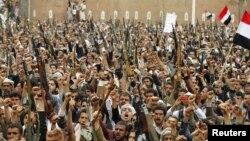In recent years, as hopeful Arab Spring uprisings have descended into wars or chaos, protests in Saudi Arabia by the Shia minority have continued under the radar, with deaths and injuries deepening sectarian divides.
Recent Islamic State attacks now threaten to raise sectarian tensions in the world’s biggest oil producer, which is already at risk as the Sunni Saudi government continues to bomb the Shia Houthis in Yemen, according to Dubai-based geopolitical analyst Theodore Karasik.
“At the moment the status of Sunni-Shia relations in Saudi Arabia are a bit tense,” he said. “The Saudis are doing their best to keep a lid on this sectarian dimension.”
For example, ethnic tensions are partially responsible for Saudi Arabia’s determination to annihilate Houthi rebels in Yemen, he said. And this, in turn, feeds religious tensions at home.
“The Saudis do not want a Shiite proto-state — from their point of view — to be formed on their southern border, which in their mind would inflame the Eastern Province,” Karasik explained.
Keeping the peace
Maintaining peace in the Eastern Province, where most Saudi Shias live, is a top propriety for the Saudi government and the outside world that depends on Saudi oil, according to Gulf State Analytics co-founder Giorgio Cafiero.
Nearly all of Saudi Arabia’s oil — about one fifth of the global supply — comes from the Eastern Province, he said.
In the past four years, 27 people have been killed and more than 200 injured in clashes in the region and a popular Shiite sheik currently remains in prison, sentenced to death.
“The Saudi Arabian economy is obviously dependent on oil exports,” said Cafiero. “So this makes the sectarian tensions in The Kingdom extremely important in terms of continued stability. For sectarian tension to intensify poses an increasingly dire risk to stability.”
Pacifying Shias, though, is not necessarily the only thing Saudi has to do to calm sectarian tensions, he added. The government also has to please the most fundamentalist among the Sunni population.
And incidents like last week’s Islamic State bombing of a Shia mosque that killed 21 people could leave the Saudi government with a near-impossible dilemma.
If the Saudi government doesn’t appear to support Shia victims of the bombing, it could anger anti-government Shias. But if the Saudi government shows too much support to the Shia population, it could anger anti-government Sunni’s, appearing “soft” on the Shia to Sunni “hardliners,” according to Cafiero.
These hardliners, he added, might then be drawn away from the Royal House of al-Saud, and toward the Islamic State group, supposedly led by Abu Bakr al-Baghdadi, who may or may not be alive.
“I think this could result in greater opposition to the regime from some of the reactionary Wahabi elements of society,” he said. “Here is a risk that more Saudi Arabians will abandon loyalty to al-Saud and pledge loyalty to al-Baghdadi.”
Some common ground
From his office in Jeddah, Editor in Chief of Saudi Arabia's leading daily newspaper Okaz, Mohammad al-Fal, cautioned that in Saudi Arabia, sectarianism is only between extremists on both sides, and most of the population is not involved.
“The Kingdom of Saudi Arabia is careful and keen to deal with all the citizens on one level,” said al-Fal.
Many Sunnis and Shias in Saudi Arabia are still mourning the mosque attack together, added Fahed al-Shelaimi, the chairman of the Gulf Peace and Security Forum in Kuwait. But the sectarian problem — largely kept quiet in the past — could ultimately undermine state security, he said.
“I think we should live with it, not ignore it,” he said. “And to live with it is to discuss.”
Going forward, this discussion has to include greater rights for Shias in Saudi, according to Haider Ghadhanfari, a historical researcher in Kuwait. Shias in Saudi complain they are under-represented in government, suffer job discrimination and jailed for peaceful opposition.
“They want rights,” he said. “Just like any Saudi citizen in the land.”





